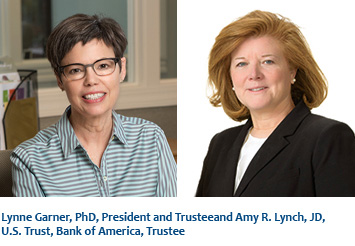Letter from the Trustees

Dear Friends,
Perhaps the two most important tasks of a trustee are the ongoing interpretation of a founder’s purpose and the search for the best ways to achieve it. Nearly forty years ago, Miss Donaghue said that her estate should be used to provide financial assistance for research in cancer, heart disease, and/or other medical research to promote medical knowledge that will be of practical benefit to improve health.
Since each of us began our role as the foundation’s two trustees, we’ve read and considered her statement of its purpose many times. The words are straightforward, yet if Miss Donaghue were here today there are questions we’d like to ask her. Why mention cancer and heart disease when she clearly states that any medical research is allowed? We know that her father died of heart disease and her mother died of cancer. We also know that in the early 1970s, just a few years before she wrote her will, Congress established major initiatives to fund research on those two diseases. Does she mention heart disease and cancer simply as an acknowledgement of their impact at that time or the personal impact they had on her?
Why not choose just one or two diseases? If she sought a practical application of her philanthropy, one might think a narrower focus would be more conducive to that. But she chose to take a different path, so there was something else that she was considering.
How would she describe what makes something practical? Did she mean the application of the research should have an immediate impact? Or that it might provide an improvement that is conferred on a larger portion of the population? Or something else?
What would Miss Donaghue’s thoughts be on potential research topics her Foundation should fund in 2018, given today’s understanding of the interaction between social, economic and environmental forces that impact our health and medical care?
Ethel Donaghue wasn’t a trained medical provider or a researcher. Although she had a legal education, we believe that her sense of the term “medical research” would broadly encompass nearly any issue that impacts the prevention, diagnosis and treatment of illness. And although she gave us the opportunity to fund a broad array of topics, our small size compels us to focus on a few themes at a time.
Currently, our major funding programs focus on improving the health of elders in care facilities and in creating a higher-value healthcare system. Among the studies funded in 2017, Donaghue will support research on using telemedicine and group medical appointments for low-resourced youth who have Type 1 diabetes to increase engagement with their treatment, developing best practices for physicians to discuss the cost of their treatment with patients who are experiencing financial hardship, and the relationships between nursing homes and accountable care organizations. We’re confident that Miss Donaghue would be pleased with these choices, but wouldn’t it be fascinating to have the chance to ask her?

Amy R. Lynch, JD
U.S. Trust, Bank of America, Trustee

Lynne Garner, PhD
President and Trustee